How to deal with cross-site scripting attacks in PHP development
With the development and popularity of the Internet, cross-site scripting attacks (Cross-Site Scripting, XSS) have become a major security risk in web development . PHP, as a language widely used in web development, also faces this problem. In this article, we will discuss how to deal with cross-site scripting attacks in PHP development to provide some solutions and practical suggestions.
- Understanding cross-site scripting attacks
First, we need to understand what a cross-site scripting attack is. A cross-site scripting attack is an attack that exploits a web application's improper processing of user input data to execute malicious scripts in the victim's browser. Attackers can obtain users' sensitive information, hijack sessions, tamper with web content, etc. by inserting malicious scripts into web pages.
- Input filtering and output encoding
In order to prevent cross-site scripting attacks, we need to process input validation and output rendering. In PHP development, we can use some filter functions to check and filter user input data. For example, the htmlspecialchars() function can convert HTML tags and special characters into HTML entities to prevent the injection of malicious code.
When outputting data to users, corresponding measures also need to be taken. In PHP, the output can be encoded using the htmlspecialchars() function to ensure that all special characters are processed correctly.
- Use proper input validation
In addition to simple input filtering and output encoding, we should also perform proper validation on the input data. For example, for form input data, you can check the data type, length limit, format requirements, etc. Input can be validated using regular expressions or PHP's built-in filter functions to prevent illegal data entry.
- Use secure database operations
When processing user input, be sure to avoid directly splicing user data into SQL query statements, which may lead to SQL injection attacks . We should use parameterized queries or prepared statements to perform database operations to ensure the security of user input data.
- Use verification codes and tokens
In order to improve security, we can use verification codes and tokens to verify user identities in some sensitive operations. CAPTCHAs protect against malicious bot attacks, and tokens protect against replay attacks and CSRF (cross-site request forgery) attacks.
- Timely updates and maintenance
In PHP development, it is very important to ensure that you use the latest version of PHP and related extension libraries. PHP officially releases security patches regularly to fix vulnerabilities and weaknesses. At the same time, we should also promptly update and repair the frameworks, libraries and third-party components we use to maintain the security of the system.
- Continue to learn and pay attention to safety
Safety is an ongoing process and there is no one-and-done solution. As developers, we should always pay attention to security and constantly learn new security knowledge and technologies. Reading security vulnerability reports, attending security training, and interacting with other developers can help us better understand and resolve security issues.
To sum up, dealing with cross-site scripting attacks in PHP development requires the comprehensive use of various technical means such as input filtering, output encoding, appropriate verification, secure database operations, verification codes and tokens. At the same time, it is also crucial to constantly pay attention to the latest developments in the security field and continue to learn. Only by maintaining good security practices can we better protect the security of web applications and users.
The above is the detailed content of How to prevent cross-site scripting attacks in PHP development?. For more information, please follow other related articles on the PHP Chinese website!
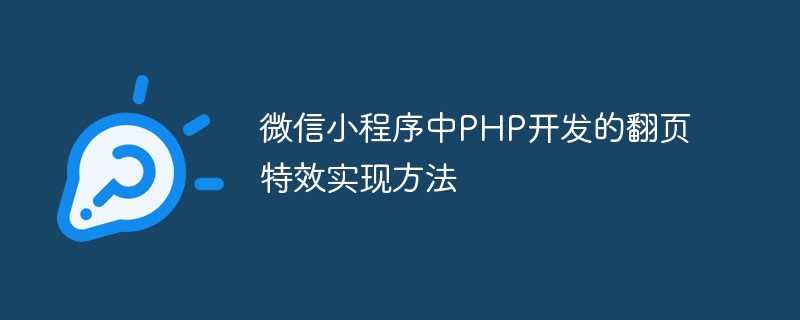 微信小程序中PHP开发的翻页特效实现方法Jun 01, 2023 pm 01:51 PM
微信小程序中PHP开发的翻页特效实现方法Jun 01, 2023 pm 01:51 PM在微信小程序中,PHP开发的翻页特效是非常常见的功能。通过这种特效,用户可以轻松地在不同的页面之间进行切换,浏览更多的内容。在本文中,我们将介绍如何使用PHP来实现微信小程序中的翻页特效。我们将会讲解一些基本的PHP知识和技巧,以及一些实际的代码示例。理解基本的PHP语言知识在PHP中,我们经常会用到IF/ELSE语句、循环结构,以及函数等一些基本语言知识。
 微信小程序中PHP开发的常用工具库介绍Jun 01, 2023 pm 07:40 PM
微信小程序中PHP开发的常用工具库介绍Jun 01, 2023 pm 07:40 PM随着微信小程序的普及和发展,越来越多的开发者开始涉足其中。而PHP作为一种后端技术的代表,也在小程序中得到了广泛的运用。在小程序的开发中,PHP常用工具库也是很重要的一个部分。本文将介绍几款比较实用的PHP常用工具库,供大家参考。一、EasyWeChatEasyWeChat是一个开源的微信开发工具库,用于快速开发微信应用。它提供了一些常用的微信接口,如微信公
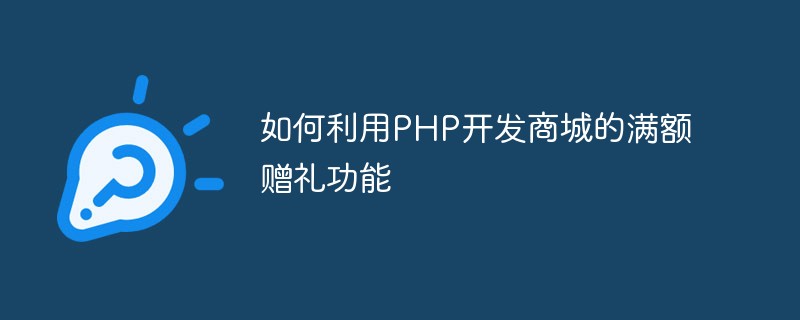 如何利用PHP开发商城的满额赠礼功能May 22, 2023 am 10:02 AM
如何利用PHP开发商城的满额赠礼功能May 22, 2023 am 10:02 AM网上购物已经成为人们日常生活中不可或缺的一部分,因此,越来越多的企业开始关注电商领域。开发一款实用、易用的商城网站也成为了企业提高销售额、拓展市场的必要手段之一。在商城网站中,满额赠礼功能是提高用户购买欲望和促进销售增长的重要功能之一。本文将探讨如何利用PHP开发商城的满额赠礼功能。一、满额赠礼功能的实现思路在商城开发中,如何实现满额赠礼功能呢?简单来说就是
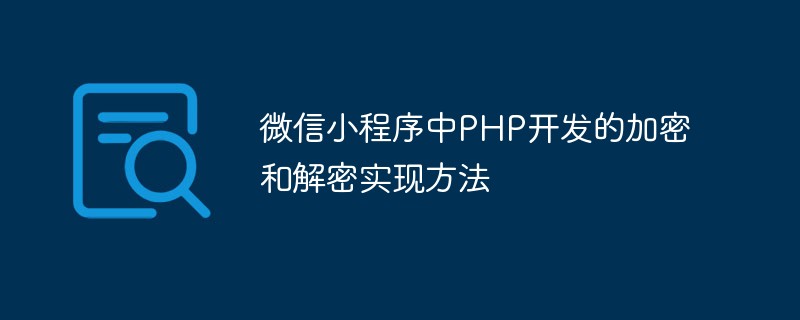 微信小程序中PHP开发的加密和解密实现方法Jun 01, 2023 am 08:12 AM
微信小程序中PHP开发的加密和解密实现方法Jun 01, 2023 am 08:12 AM随着微信小程序在移动应用市场中越来越流行,它的开发也受到越来越多的关注。在小程序中,PHP作为一种常用的后端语言,经常用于处理敏感数据的加密和解密。本文将介绍在微信小程序中如何使用PHP实现加密和解密。一、什么是加密和解密?加密是将敏感数据转换为不可读的形式,以确保数据在传输过程中不被窃取或篡改。解密是将加密数据还原为原始数据。在小程序中,加密和解密通常包括
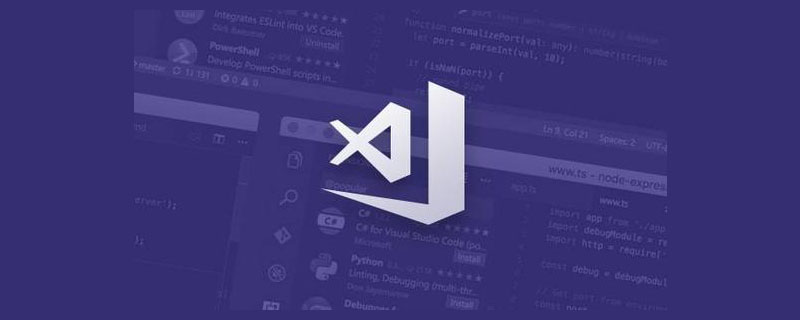 PHP开发中提供效率的VSCode插件推荐(值得收藏)Mar 30, 2021 pm 07:31 PM
PHP开发中提供效率的VSCode插件推荐(值得收藏)Mar 30, 2021 pm 07:31 PM本篇文章给大家推荐一些VSCode+PHP开发中实用的插件。有一定的参考价值,有需要的朋友可以参考一下,希望对大家有所帮助。
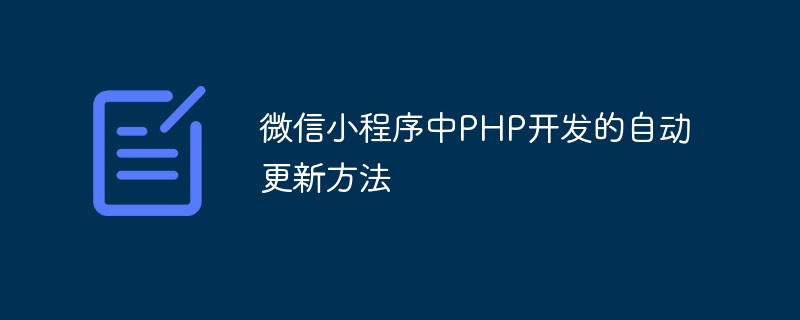 微信小程序中PHP开发的自动更新方法Jun 01, 2023 pm 11:40 PM
微信小程序中PHP开发的自动更新方法Jun 01, 2023 pm 11:40 PM近年来,移动互联网的快速发展和移动终端的普及,让微信应用程序成为了人们生活中不可或缺的一部分。而在微信应用程序中,小程序更是以其轻量、快速、便捷的特点受到了广泛的欢迎。但是,对于小程序中的数据更新问题,却成为了一个比较头疼的问题。为了解决这一问题,我们可以使用PHP开发的自动更新方法来实现自动化数据更新。本篇文章就来探讨一下微信小程序中PHP开发的自动更新方
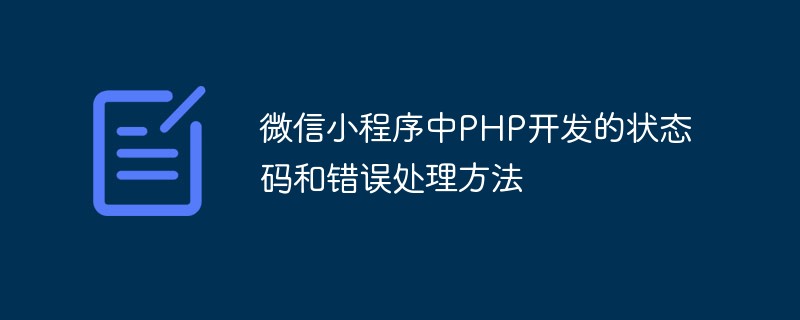 微信小程序中PHP开发的状态码和错误处理方法May 31, 2023 pm 07:52 PM
微信小程序中PHP开发的状态码和错误处理方法May 31, 2023 pm 07:52 PM作为目前最流行的社交媒体平台之一,微信已经成为了企业和个人互动沟通的重要渠道之一。而微信小程序则更加方便用户使用和开发者创新。在小程序开发中,PHP是一种重要的后端技术,但是在开发过程中很容易出现状态码和错误处理方面的问题。本文将介绍微信小程序中PHP开发的各种状态码和错误处理方法。一、微信小程序中的状态码在微信小程序中,HTTP状态码(HTTPStatu
 微信小程序中PHP开发的文本框自动完成功能实现方法Jun 01, 2023 pm 07:42 PM
微信小程序中PHP开发的文本框自动完成功能实现方法Jun 01, 2023 pm 07:42 PM随着微信小程序的普及,各类开发需求也日渐增多。其中,文本框自动完成功能是小程序中常用的功能之一。虽然微信小程序提供了一些原生的组件,但是有一些特殊需求还是需要进行二次开发。本文将介绍如何使用PHP语言实现微信小程序中文本框自动完成功能。准备工作在开始开发之前,需要准备一些基本的环境和工具。首先,需要安装好PHP环境。其次,需要在微信小程序后台获取到自己的Ap


Hot AI Tools

Undresser.AI Undress
AI-powered app for creating realistic nude photos

AI Clothes Remover
Online AI tool for removing clothes from photos.

Undress AI Tool
Undress images for free

Clothoff.io
AI clothes remover

AI Hentai Generator
Generate AI Hentai for free.

Hot Article

Hot Tools

mPDF
mPDF is a PHP library that can generate PDF files from UTF-8 encoded HTML. The original author, Ian Back, wrote mPDF to output PDF files "on the fly" from his website and handle different languages. It is slower than original scripts like HTML2FPDF and produces larger files when using Unicode fonts, but supports CSS styles etc. and has a lot of enhancements. Supports almost all languages, including RTL (Arabic and Hebrew) and CJK (Chinese, Japanese and Korean). Supports nested block-level elements (such as P, DIV),

Safe Exam Browser
Safe Exam Browser is a secure browser environment for taking online exams securely. This software turns any computer into a secure workstation. It controls access to any utility and prevents students from using unauthorized resources.

MinGW - Minimalist GNU for Windows
This project is in the process of being migrated to osdn.net/projects/mingw, you can continue to follow us there. MinGW: A native Windows port of the GNU Compiler Collection (GCC), freely distributable import libraries and header files for building native Windows applications; includes extensions to the MSVC runtime to support C99 functionality. All MinGW software can run on 64-bit Windows platforms.

Notepad++7.3.1
Easy-to-use and free code editor

SublimeText3 Linux new version
SublimeText3 Linux latest version






